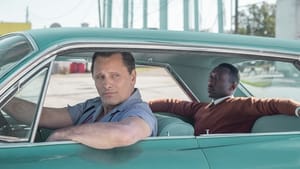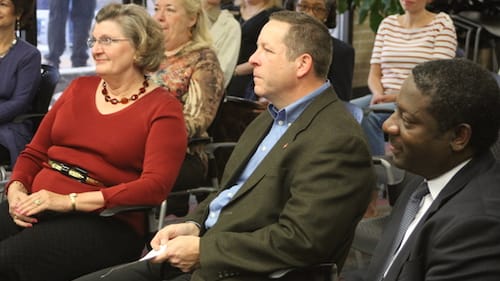Stay in the Loop
BSR publishes on a weekly schedule, with an email newsletter every Wednesday and Thursday morning. There’s no paywall, and subscribing is always free.
Out of focus
Peter Farrelly's 'Green Book'

I figured that by 2018 we'd have seen the last of movies like Peter Farrelly’s Green Book, but I was wrong. It's another movie about racism and the civil rights era that's told almost entirely through the eyes of a white guy. This isn't a film about racism; it's the true story of a white man noticing racism.
Farrelly — yes, the codirector of There's Something About Mary and Dumb and Dumber — makes a long list of bad directorial choices. The plot isn't all that interesting and its leading man, Viggo Mortensen, gives a comically bad performance.
Green Book also engages in some of the most egregious stereotypes of Italian-Americans I've ever seen in a film, and that’s somehow not even the most offensive thing about it. The worst choice of all is that it focuses on the wrong person.
Odd couple
Set in 1962, the film concerns an Italian-American bar bouncer from New York named Tony Vallelonga, a.k.a. Tony Lip. On the basis of his skill at punching out troublemakers, he is enlisted to drive Don "Doc" Shirley (Mahershala Ali), a black concert pianist, on an eight-week tour that includes stops in the Deep South.
If you ever wanted a semi-remake of Driving Miss Daisy but with two men and the white guy driving, this is your movie.
The two clash at first, not only because of their racial differences but also because Doc is educated and worldly, while Tony is neither. They later bond, and mistreatment by drunk rednecks, snooty hotel managers, and thuggish small-town cops teach Tony a lesson about rethinking his racial prejudice.
Mortensen and Ali may be billed as coleads, but this is Tony Lip's story (his son, Nick Vallelonga, cowrote the screenplay), and its emotional stakes belong to Tony's personal enlightenment. Doc Shirley's safety and dignity while traveling in Louisiana and Mississippi merely serve as a vehicle for Tony’s awakening.
"I'm workin' here!"
Mortenson looks and acts like a bit player in a gangster movie, which makes sense considering that Tony Lip really did become a tough-guy actor later in life, playing small parts in The Godfather, Goodfellas, Donnie Brasco, and The Sopranos. But if Mortenson, at his most hamhanded, gets award nominations for this on the basis of gaining weight and acting very loudly, it'll be a travesty.
Tony is a walking, talking Italian stereotype, up to and including scarfing down sandwiches, befriending gangsters, wearing a sleeveless white shirt, and declaring, "I'm workin' here!" He's depicted as obnoxious, vulgar, and gluttonous. At one point, Tony grabs a large pizza, folds it in half, and eats the whole thing with his hands. I think a guy qualified for WIP's Wing Bowl a few years ago by doing exactly that.

Tony's extended family, meanwhile, is so in line with Italian stereotypes I'm surprised Tony Danza isn't in the cast. The only one who makes much of an impression is Linda Cardellini as Tony's wife Dolores, even if she's playing a stock character: the Lone Secret White Liberal.
Ali, an Oscar winner for Moonlight, fares much better, although aside from a pair of memorable monologues, the script doesn't give him nearly enough to do. Most notably, Shirley's motivation to travel to the Deep South is never described in his own words; the pivotal moment in which it is explained is done so by a different character, to a third character.
So many options
Doc Shirley was born in Jamaica in 1927. A childhood music prodigy, he enjoyed an acclaimed career before his death in 2013. While not a household name, he seems to have lived a long, unique, and fascinating life.
Shirley succeeded as a multitalented musician when doing so wasn't easy for a man who was black and gay. I would absolutely watch an entire biopic about his life, preferably with Ali in the leading role.
But even if it wasn't a full-on biopic, I bet there are at least a dozen small moments in Doc Shirley's life that would have been worthier of a major motion picture than the time his driver learned not to be racist.
In the '80s and '90s, historical movies about racism from white directors, about white protagonists, and showing the events through white eyes were a dime a dozen. One of them, Alan Parker's 1988 Mississippi Burning, even somehow made white FBI agents the heroes of a story about the murders of civil rights workers in 1964. More recently, the trend has continued with mediocre Oscar-bait movies like The Blind Side and The Help.
But we've also seen a wave of films tackling race and racism in new, creative ways: consider Jordan Peele's Get Out, Ava DuVernay's Selma, Boots Riley's Sorry to Bother You, Spike Lee's BlacKkKlansman, George Tillman Jr.'s The Hate U Give, and Barry Jenkins's If Beale Street Could Talk. These excellent films come from black directors and center black characters.
If Beale Street Could Talk and Green Book were both Philadelphia Film Festival centerpieces in October 2018 and arrive in wide release in the next couple of weeks. Beale Street is superior in just about every way.
What, When, Where
Green Book. Written by Nick Vallelonga and Brian Hayes Currie, Peter Farrelly directed. Philadelphia area showtimes.
Sign up for our newsletter
All of the week's new articles, all in one place. Sign up for the free weekly BSR newsletters, and don't miss a conversation.

 Stephen Silver
Stephen Silver